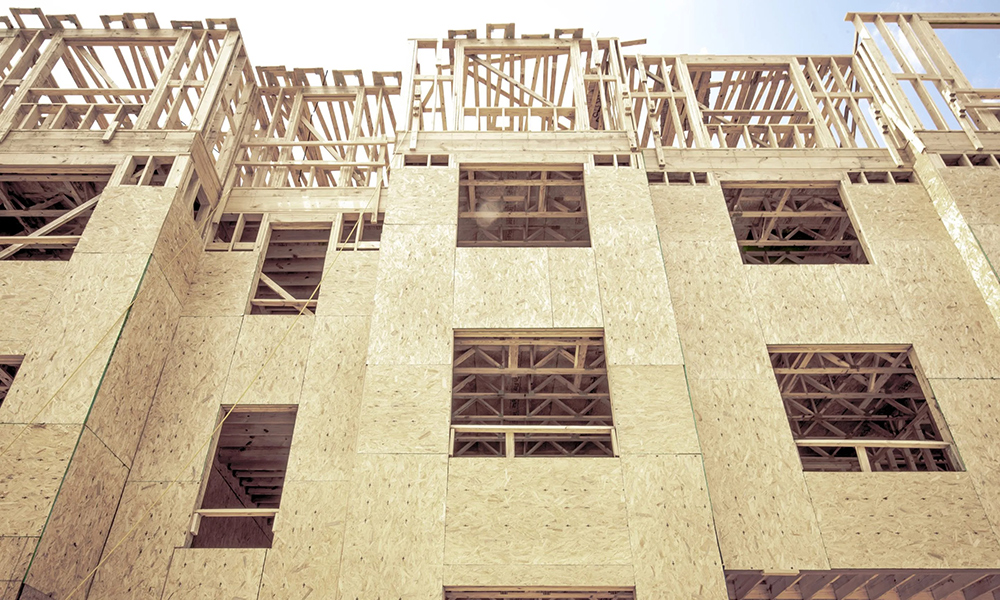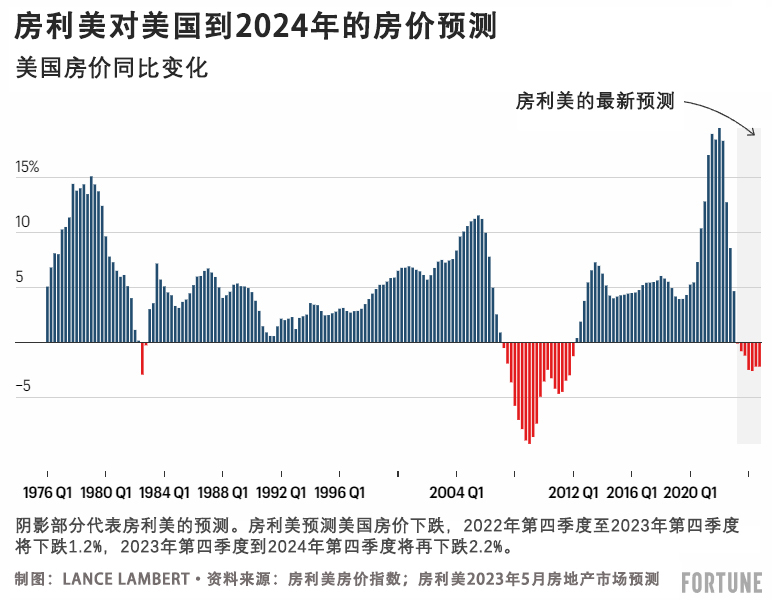
在看好房地產(chǎn)市場的人們眼里,美國房地產(chǎn)市場已經(jīng)趨于穩(wěn)定,。激進(jìn)的建筑商激勵將購房人重新拉回市場,,新房銷量再次上漲。與此同時,,抵押貸款利率跌回至7%以下,,而且房地產(chǎn)市場進(jìn)入了更加熱鬧的春季,因此許多區(qū)域房地產(chǎn)市場從回調(diào)模式進(jìn)入了增長模式,。事實(shí)上,,在Zillow跟蹤的區(qū)域房地產(chǎn)市場中,只有16%的市場在今年3月至4月期間房價下跌,。
但房地產(chǎn)市場最糟糕的情況即將來臨,。或者已經(jīng)來臨,?
房地產(chǎn)市場衰退并未結(jié)束,,而且隨著市場進(jìn)入夏季和秋季等季節(jié)性增速放緩的月份,市場可能恢復(fù)下跌的勢頭,。至少房利美(Fannie Mae)剛剛公布的修訂后預(yù)測是這樣認(rèn)為,。
2023年第一季度,從私人住宅固定投資(即房地產(chǎn)業(yè)GDP的核心)來看,,美國房地產(chǎn)市場的名義投資金額連續(xù)四個季度呈下降趨勢,。而且市場可能進(jìn)一步收縮。房利美預(yù)測,,2023年第二季度(-5.9%),、第三季度(-9.1%)、第四季度(-6.4%)和2024年第一季度(-1%),,住宅固定投資將持續(xù)下降,。
房利美的經(jīng)濟(jì)學(xué)家在5月19日發(fā)布的報告中表示:“目前在建多戶住宅數(shù)量創(chuàng)新高,這些住宅將于今年晚些時候和2024年上市,。此外建筑貸款信貸收緊,,很快新建項目數(shù)量增長將會放緩,,我們預(yù)計今年晚些時候,美國房地產(chǎn)市場會大幅下滑,?!?/p>
房利美的預(yù)測稱,多戶住宅價格下跌,,將使在單戶住宅領(lǐng)域的任何經(jīng)濟(jì)刺激措施失效,。今年春季,建筑商提供的買低抵押貸款利率等激勵措施,,刺激了單戶住宅市場的發(fā)展,。
過去一年,房地產(chǎn)市場是美國少數(shù)幾個陷入衰退的經(jīng)濟(jì)領(lǐng)域,。這種情況可能很快發(fā)生變化:房利美的預(yù)測模型認(rèn)為,,美國房地產(chǎn)市場衰退將產(chǎn)生溢出效應(yīng),讓美國經(jīng)濟(jì)陷入衰退,。事實(shí)上,,房利美預(yù)測2023年第三季度(-1.2%)、第四季度(-1.7%)和2024年第一季度(-0.5%),,美國的GDP都將處于下降趨勢,。
房利美的經(jīng)濟(jì)學(xué)家寫道:“如果與工資相關(guān)的通脹壓力沒有消失,美聯(lián)儲(Federal Reserve)可能就會在更長時間內(nèi)延續(xù)更緊縮的政策,,這最有可能導(dǎo)致的結(jié)果是美國經(jīng)濟(jì)陷入適度衰退,,但衰退發(fā)生時間依舊是一個巨大的未知數(shù)?!?/p>
雖然房利美的預(yù)測模型認(rèn)為,,美國房地產(chǎn)市場將把美國經(jīng)濟(jì)拉入衰退,但其經(jīng)濟(jì)學(xué)家也認(rèn)為,,房地產(chǎn)市場將是抵御嚴(yán)重經(jīng)濟(jì)衰退的緩沖,。
他們在5月19日稱:“我們認(rèn)為住宅建設(shè)和汽車行業(yè)的狀況,更有可能成為抵御嚴(yán)重經(jīng)濟(jì)衰退的緩沖,,它們可能成為最終刺激經(jīng)濟(jì)復(fù)蘇的驅(qū)動力,,而不是防止經(jīng)濟(jì)衰退的工具?!?/p>

這對房價意味著什么,?
Zillow和CoreLogic等均預(yù)測未來一年,美國房價將小幅上漲,,但房利美認(rèn)為房價可能很快恢復(fù)下降的勢頭,。房利美的預(yù)測模型根據(jù)房利美房價指數(shù)(Fannie Mae Home Price Index),認(rèn)為美國房價在2022年第四季度至2023年第四季度將下跌1.2%,,2023年第四季度到2024年第四季度將再下跌2.2%,。如果房利美的預(yù)測成真,這就將是自2012年以來,,房利美房價指數(shù)評估的首次房價同比下跌,。
房利美預(yù)測,到2024年第四季度,,全美房價將跌至最低點(diǎn),,從2022年第二季度的最高點(diǎn)下跌5.28%。各區(qū)域的房價存在巨大差異,。
房利美的預(yù)測結(jié)果是適度回調(diào),,而不是房地產(chǎn)市場崩潰。
房利美表示,,全美房價下跌的原因不太可能歸咎于缺少轉(zhuǎn)售庫存,。事實(shí)上,有效庫存依舊比新冠疫情之前的水平低40%,。
房利美的首席經(jīng)濟(jì)學(xué)家道格·鄧肯在最近的報告中寫道:“雖然抵押貸款利率依舊高于前幾年的水平,,但房地產(chǎn)供應(yīng)嚴(yán)重不足將有助于維持房價。當(dāng)然,,待售房屋短缺目前因為所謂的‘鎖定效應(yīng)’而進(jìn)一步加劇,,這會繼續(xù)令大批享受低抵押貸款利率的家庭放棄將房子掛牌出售?!保ㄘ敻恢形木W(wǎng))
譯者:劉進(jìn)龍
審校:汪皓
在看好房地產(chǎn)市場的人們眼里,,美國房地產(chǎn)市場已經(jīng)趨于穩(wěn)定。激進(jìn)的建筑商激勵將購房人重新拉回市場,,新房銷量再次上漲,。與此同時,抵押貸款利率跌回至7%以下,,而且房地產(chǎn)市場進(jìn)入了更加熱鬧的春季,,因此許多區(qū)域房地產(chǎn)市場從回調(diào)模式進(jìn)入了增長模式。事實(shí)上,,在Zillow跟蹤的區(qū)域房地產(chǎn)市場中,,只有16%的市場在今年3月至4月期間房價下跌。
但房地產(chǎn)市場最糟糕的情況即將來臨,?;蛘咭呀?jīng)來臨?
房地產(chǎn)市場衰退并未結(jié)束,,而且隨著市場進(jìn)入夏季和秋季等季節(jié)性增速放緩的月份,,市場可能恢復(fù)下跌的勢頭。至少房利美(Fannie Mae)剛剛公布的修訂后預(yù)測是這樣認(rèn)為,。
2023年第一季度,,從私人住宅固定投資(即房地產(chǎn)業(yè)GDP的核心)來看,,美國房地產(chǎn)市場的名義投資金額連續(xù)四個季度呈下降趨勢。而且市場可能進(jìn)一步收縮,。房利美預(yù)測,,2023年第二季度(-5.9%)、第三季度(-9.1%),、第四季度(-6.4%)和2024年第一季度(-1%),,住宅固定投資將持續(xù)下降。
房利美的經(jīng)濟(jì)學(xué)家在5月19日發(fā)布的報告中表示:“目前在建多戶住宅數(shù)量創(chuàng)新高,,這些住宅將于今年晚些時候和2024年上市,。此外建筑貸款信貸收緊,很快新建項目數(shù)量增長將會放緩,,我們預(yù)計今年晚些時候,,美國房地產(chǎn)市場會大幅下滑?!?/p>
房利美的預(yù)測稱,,多戶住宅價格下跌,將使在單戶住宅領(lǐng)域的任何經(jīng)濟(jì)刺激措施失效,。今年春季,,建筑商提供的買低抵押貸款利率等激勵措施,刺激了單戶住宅市場的發(fā)展,。
過去一年,,房地產(chǎn)市場是美國少數(shù)幾個陷入衰退的經(jīng)濟(jì)領(lǐng)域。這種情況可能很快發(fā)生變化:房利美的預(yù)測模型認(rèn)為,,美國房地產(chǎn)市場衰退將產(chǎn)生溢出效應(yīng),,讓美國經(jīng)濟(jì)陷入衰退。事實(shí)上,,房利美預(yù)測2023年第三季度(-1.2%),、第四季度(-1.7%)和2024年第一季度(-0.5%),美國的GDP都將處于下降趨勢,。
房利美的經(jīng)濟(jì)學(xué)家寫道:“如果與工資相關(guān)的通脹壓力沒有消失,,美聯(lián)儲(Federal Reserve)可能就會在更長時間內(nèi)延續(xù)更緊縮的政策,這最有可能導(dǎo)致的結(jié)果是美國經(jīng)濟(jì)陷入適度衰退,,但衰退發(fā)生時間依舊是一個巨大的未知數(shù),。”
雖然房利美的預(yù)測模型認(rèn)為,,美國房地產(chǎn)市場將把美國經(jīng)濟(jì)拉入衰退,,但其經(jīng)濟(jì)學(xué)家也認(rèn)為,房地產(chǎn)市場將是抵御嚴(yán)重經(jīng)濟(jì)衰退的緩沖,。
他們在5月19日稱:“我們認(rèn)為住宅建設(shè)和汽車行業(yè)的狀況,,更有可能成為抵御嚴(yán)重經(jīng)濟(jì)衰退的緩沖,,它們可能成為最終刺激經(jīng)濟(jì)復(fù)蘇的驅(qū)動力,而不是防止經(jīng)濟(jì)衰退的工具,?!?/p>
這對房價意味著什么?
Zillow和CoreLogic等均預(yù)測未來一年,,美國房價將小幅上漲,但房利美認(rèn)為房價可能很快恢復(fù)下降的勢頭,。房利美的預(yù)測模型根據(jù)房利美房價指數(shù)(Fannie Mae Home Price Index),,認(rèn)為美國房價在2022年第四季度至2023年第四季度將下跌1.2%,2023年第四季度到2024年第四季度將再下跌2.2%,。如果房利美的預(yù)測成真,,這就將是自2012年以來,房利美房價指數(shù)評估的首次房價同比下跌,。
房利美預(yù)測,,到2024年第四季度,全美房價將跌至最低點(diǎn),,從2022年第二季度的最高點(diǎn)下跌5.28%,。各區(qū)域的房價存在巨大差異。
房利美的預(yù)測結(jié)果是適度回調(diào),,而不是房地產(chǎn)市場崩潰,。
房利美表示,全美房價下跌的原因不太可能歸咎于缺少轉(zhuǎn)售庫存,。事實(shí)上,,有效庫存依舊比新冠疫情之前的水平低40%。
房利美的首席經(jīng)濟(jì)學(xué)家道格·鄧肯在最近的報告中寫道:“雖然抵押貸款利率依舊高于前幾年的水平,,但房地產(chǎn)供應(yīng)嚴(yán)重不足將有助于維持房價,。當(dāng)然,待售房屋短缺目前因為所謂的‘鎖定效應(yīng)’而進(jìn)一步加劇,,這會繼續(xù)令大批享受低抵押貸款利率的家庭放棄將房子掛牌出售,。”(財富中文網(wǎng))
譯者:劉進(jìn)龍
審校:汪皓
The U.S. housing market, in the telling of housing bulls, has stabilized. New home sales are rising again, as aggressive builder incentives pull buyers back into the market. Meanwhile, mortgage rates falling back under 7%, combined with the housing market entering into the busier spring season, has seen many regional housing markets flip from correction mode to growth mode. In fact, only 16% of regional housing markets tracked by Zillow saw a home price decline between March and April.
When it comes to housing, the worst is behind us. Or is it?
The housing market recession isn’t over just yet—and it could regain momentum as the market moves into the seasonally slower summer and fall months. At least that’s according to a revised forecast just put out by Fannie Mae.
Through the first quarter of 2023, U.S. housing market activity as measured by private residential fixed investment (i.e. the core of housing GDP) has declined, on a nominal basis, for four straight quarters. And more contractions could be on the horizon. Indeed, Fannie Mae expects residential fixed investment to fall in Q2 2023 (-5.9%), Q3 2023 (-9.1%), Q4 2023 (-6.4%), and Q1 2024 (-1%).
“There is a record number of multifamily units currently under construction, which are scheduled to come online later this year and into 2024. Combined with tightening credit for construction lending, which we expect will soon be realized by a slower new project pipeline, we are expecting a significant slowdown in starts later this year,” wrote Fannie Mae economists in their report published on May 19.
The pullback on the multifamily side, according to the Fannie Mae forecast, will negate any economic boosts created on the single-family side, which has benefited this spring from builder incentives like mortgage rate buydowns.
Over the past year, the housing market has been one of the few areas of the economy stuck in recession. That could soon change: Fannie Mae’s forecast model thinks declines in the U.S. housing market will spill over and help to push the U.S. economy into a recession. Indeed, Fannie Mae is forecasting U.S. GDP declines in Q3 2023 (-1.2%), Q4 2023 (-1.7%), and Q1 2024 (-0.5%).
“A modest recession is the likeliest outcome—and that its timing remains the principal outstanding question—as the Fed is likely to maintain tighter policy for longer if wage-related inflationary pressures do not subside,” wrote Fannie Mae economists.
While Fannie Mae’s forecast model predicts that the U.S. housing market will help to drag the economy into recession, Fannie Mae economists also believe that the U.S. housing market will be a buffer against a deep recession.
“We see the conditions in the housing construction and auto sectors as likely being more of a buffer to the severity of a recession by being potential drivers of eventual recovery than a means to prevent one,” wrote Fannie Mae economists on May 19.
What does this mean for home prices?
Unlike Zillow and CoreLogic, which are forecasting slight home price gains over the next year, Fannie Mae thinks the home price correction will soon regain momentum. Fannie Mae's forecast model has U.S. home prices, as measured by the Fannie Mae Home Price Index, falling 1.2% between Q4 2022 and Q4 2023, and then another 2.2% decline between Q4 2023 and Q4 2024. If those declines come to fruition, it'd mark the first year-over-year declines measured by the Fannie Mae Home Price Index since 2012.
By the time national home prices bottom in Q4 2024, Fannie Mae predicts U.S. home prices will be 5.28% lower than the peak in Q2 2022. Regionally speaking, the outcomes are likely to vary—a lot.
That forecast is a mild correction—not a housing crash.
The reason Fannie Mae says a national home price crash is unlikely boils down to the lack of resale inventory. In fact, active inventory is still 40% below pre-pandemic levels.
"Even though mortgage rates remain elevated compared to the previous few years, the acute lack of housing supply remains supportive of home prices. Of course, the shortage of homes for sale is currently being exacerbated by the so-called ‘lock-in effect,’ which continues to disincentivize huge numbers of households with low mortgage rates from listing their homes," wrote Fannie Mae chief economist Doug Duncan in a recent report.






